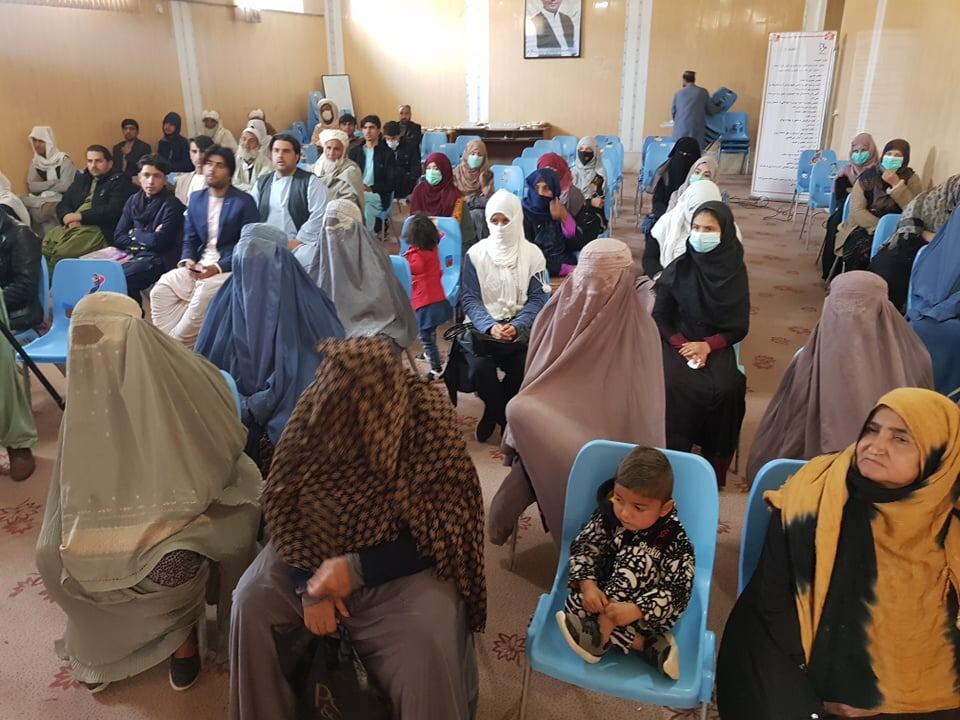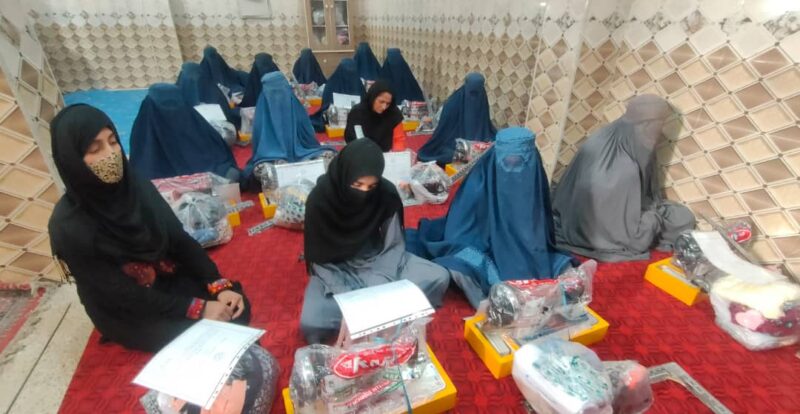As we mark the closure of 16 Days of Activism for Elimination of Violence Against Women for the year 2020, we the members of Provincial Women Networks active in fifteen provinces of Afghanistan applaud the international community for supporting Afghanistan and standing with Afghan women to safeguard their rights. Afghanistan just witnessed another generous round of support from international partners and allies in the form of $13 billion in assistance commitments at the November 2020 pledging conference in Geneva.
Afghan society has evolved with respect to the role played by women, which has become increasingly significant over the last two decades. Today, women are seen not only in higher positions like ambassadors, ministers and deputy minister, but women are participating in sectors like security, justice, public health etc. Adolescent girls’ literacy rate is increased to 37% in comparison to literally 0% in 2001 and the maternal mortality is decreased to 400/100,000 from 1390/100,000 in 2001. Despite substantial improvements made with regard to gender equality since the removal of the Taliban in 2001, Afghan women still live precarious lives, as our country is regularly ranked among worst places to be born female.
During the COVID-19 pandemic, Afghan women have continued to suffer from some of the world’s highest rates of sexual and gender-based violence, which affects 87 percent of the female population. Sexual and gender-based violence in the form of child marriage, domestic violence, denial of inheritance rights, baad, badal and virginity testing remain common practices. As grassroots networks working closely with rural communities, we play a crucial role in preventing sexual and gender-based violence against women, increasing women’s participation in the peace process, and promoting women’s equitable access to public services such as health and education.
In the year 2020, in collaboration with community elders, religious leaders and youth groups, we engaged with more than 20,000 members of our communities through community dialogues and door to door campaigns to raise awareness about COVID-19, preventive measures to be taken by communities and the impact of the pandemic on mental health leading to an increase in cases of domestic violence. We also provided our communities platforms to share their stories about how COVID-19 has affected their lives and how they are coping with the crisis. This work was crucial, especially in the early phase of the pandemic as most people did not have access even to basic information about COVID-19.
In addition, PWN members met the officials in Departments of Women’s Affairs, Public Health and Provincial Governors on a regular basis to share with them the issues and challenges that the communities faced during the pandemic, as well as to update ourselves about government policies and interventions related to the pandemic, mental health and domestic violence. Some of our members also attended meeting of Coordination Committees established by Public Health and Women’s Affairs Departments.
As women living in different provinces of Afghanistan, working with communities at the grass- roots level on different issues such as peacebuilding, conflict resolution, good governance and dealing with the pandemic, we would like to share our views with regard to violence against women with all actors including the Government, Taliban, Civil Society and International Community:
- Impact of Domestic Violence on Children: During our dialogues and door-to-door campaigns we observed that domestic violence within households is not only affecting mothers but also severely affecting the well-being and self-esteem of children. When behaving violently toward mothers, men seldom realize that they are psychologically torturing their children as well. To sensitize men about adverse effects of violence against women we used the tactic that violence also adversely affects the well-being of their own children and not just the women. We found that men took this more seriously, as they did seem to care about their children (especially boys) if not their women. Thus, we suggest to raise awareness about the consequences of domestic violence on childere. Nasrin’s daughter committed suicide because she could not tolerate the violence against her mother. https://www.youtube.com/watch?v=ZeQyW19uVBM&t=17s

- Role of Family Members in Elimination of Violence: We also observed that, no matter how severe the violence against women gets, the family members believe that the violence is a domestic issue not to be interfered with. We found it to be effective, when elimination of violence is presented as an ethical imperative or religious obligation, closed and extended family members take a stronger stand against domestic violence. We therefore believe it is important that communities are made aware of the important role that family members can play in mitigating violence against women by taking a principled stand. Sahra was forced to early marriage by her family and beaten not only by her husband but his family, she could decide to divorce her husband only when she was supported by her family. https://wwyoutube.com/watch?v=ZeQyW19uVBM&t=224s
- Formal and Informal Justice are Both Harsh to Women: While listening to the stories of victims of violence, we realized that the formal and informal justice systems are both harsh towards women. Informal justice providers subject women to stoning and killing while the formal justice system exposes them to corruption and sexual predators. There were several cases in our communities wherein women were asked for sexual favors by attorneys and judges in return for a favorable judgement. We need to create independent structures for monitoring performance of public institutions and producing independent public reports. We have seen that informal justice mechanisms generally exclude women from participation and are known to issue decisions that violate women’s rights, therefore it is recommended that women should be allowed to participate in informal justice processes in order to support other women through their cases.
- Legal Awareness and Support are Effective for the Victims of Violence: In our dialogues and campaigns, we observed that while many women still tolerate violence as a norm, only those women could stand against it who became aware of their basic rights and were provided with legal support. It is therefore important that, while we raise awareness of women about their basic rights, we also make sure to have the structures and institutions in place that will provide women with legal aid. Nazo from Nangarhar province could only said no to violence when she was provided with legal assistance. https://wwyoutube.com/watch?v=Prq8yGywVFM&t=7s
- Women’s Economic Empowerment Enable Them to Stand Against Violence: It is more frustrating for women to understand their rights but do not exercise them. The inability to access and exercise their own rights often leads to frustration and depression and pushes women to take drastic measures like self-immolation. However, we have seen that when women are economically independent, men not only respect them but also treat them as equals or even when their rights are violated, they can stand against violence and discrimination. It is therefore important that we support women to become economically self-sufficient.

- Promoting Role Models for Standing Against Violence: During our dialogues and campaigns, we have also observed that there is a good number of men, youth, religious leaders and community elders who oppose violence against women based on principle and are also vocal about it. We need to promote such leaders and activists as role models within our communities to inspire others to stand against violence. While Fatima was punished by her family because she was impregnated and abandoned by her boyfriend, she finds happiness marrying a man who stands with her by not only marrying her but also adopting her child. https://wwyoutube.com/watch?v=J3H5ArIGriQ
We the women from rural Afghanistan, have witnessed significant developments with regards to women’s role in the families, communities and society. The results of all the efforts and investments for women’s rights and advancement are quite visible now. We believe that the only way to a peaceful society is to eliminate violence and harassment and allow all citizens to exercise their rights and enjoy their freedom. It is therefore important that we continue our efforts in further promoting women’s rights as a joint societal value. We need to regard families and people based on how they treat women and poor people rather than their positions, villas, armored cars and bodyguards.
Provincial Women Networks are registered with Ministry of Justice of Afghanistan as grassroots networks. PWNs are bringing women together from different walks of life in each province to build trust and confidence, make alliances with different actors and work in their communities towards conflict resolution, peacebuilding and service delivery. The PWNs are active with 30 to 40 members in 15 provinces (Kabul, Parwan, Bamyan, Daikundi, Helmand, Kandahar, Uruzgan, Paktya, Nangarhar, Laghman, Kunduz, Badakhshan, Balkh, Faryab and Herat). These networks were established by EQUALITY for Peace and Development (EPD) in seven provinces in 2012 and later expanded to cover fifteen provinces with technical support from Cordaid. The members are receiving tailored trainings and capacity buildings that are based on their needs to become more effective mediators and peacebuilders in their communities. As of now they have mediated, advocated and resolved more than 1,118 cases, which includes conflicts resolution cases, violence against women cases, prevention of child marriages, educating and empowering women, job placements, women’s political participation and promoting girls education in their communities. PWN members are also meeting on a regular basis among themselves to exchange ideas and share knowledge with each other as well as interact with women leaders, policy makers and others presenting their perspectives about conflict, peace and governance. PWNs’s awareness raising and advocacy activities with regard to COVID19 and its relation with mental health and domestic violence was also supported by Canadian Embassy’s Community Fund for Local Initiatives (CFLI).
Here is links:
PWN Statement On 16Days of Activism-Dari

